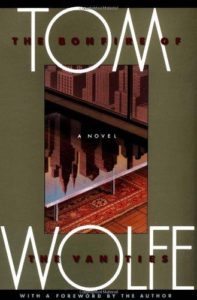Tom Wolfe, who died yesterday, was a card-carrying member of the Grand Old Party of Reality, a journalist whose sole and only loyalty was to the facts painstakingly gathered by hand and scribbled down in his reporter’s notebook. What they told him was what he believed, and the flamboyant manner in which he wrote them up made him rich and famous.
 It was Wolfe’s genius to realize in middle age, however, that his gifts were less specifically for journalism than for a very particular kind of novelistic fiction, the kind animated by first-hand reportage. Out of that realization came The Bonfire of the Vanities, an old-fashioned book written in a newfangled style, one that still sounds electrically fresh three decades after the fact. It is the brash, noisy voice of Wolfe’s Sixties journalism bent to the iron will of a novelist’s imagination—but a novelist who has pledged allegiance to the visible world. The Bonfire of the Vanities is The Way We Live Now, only devoid of the Victorian moralist’s anger, amused instead of outraged by the proliferating follies of New York City in the late Eighties: a Trollope de nos jours, disillusioned and proud of it, determined above all things to tell the truth.
It was Wolfe’s genius to realize in middle age, however, that his gifts were less specifically for journalism than for a very particular kind of novelistic fiction, the kind animated by first-hand reportage. Out of that realization came The Bonfire of the Vanities, an old-fashioned book written in a newfangled style, one that still sounds electrically fresh three decades after the fact. It is the brash, noisy voice of Wolfe’s Sixties journalism bent to the iron will of a novelist’s imagination—but a novelist who has pledged allegiance to the visible world. The Bonfire of the Vanities is The Way We Live Now, only devoid of the Victorian moralist’s anger, amused instead of outraged by the proliferating follies of New York City in the late Eighties: a Trollope de nos jours, disillusioned and proud of it, determined above all things to tell the truth.
And what was that truth? In retrospect, it seems clearer than ever that Bonfire had two things to tell its readers about New York. First, that it was a city of classes, rigidly stratified and riven with envy and fear; second, that it was no less deeply divided by ethnicity. Nothing else mattered. To understand a New Yorker, Wolfe declared, you needed only to plot two points on that pair of intersecting axes, and you could do it without inquiring about his interior life. Was he black or Jewish? Did he wear sneakers or British hand-lasted shoes? That was all you knew and all you needed to know.
 All this goes a long way toward explaining the colossal impact Bonfire had back in 1987. I remember reading it with the same sense of bedazzled revelation that George Orwell’s Winston Smith read The Theory of Oligarchical Collectivism. It was as though the veil of euphemism had been pulled back—no, ripped down—and for the first time I saw New York as it was:
All this goes a long way toward explaining the colossal impact Bonfire had back in 1987. I remember reading it with the same sense of bedazzled revelation that George Orwell’s Winston Smith read The Theory of Oligarchical Collectivism. It was as though the veil of euphemism had been pulled back—no, ripped down—and for the first time I saw New York as it was:
Cattle! Birdbrains! Rosebuds! Goyim! You don’t even know, do you? Do you really think this is your city any longer? Open your eyes! The greatest city of the twentieth century! Do you think money will keep it yours?…You don’t think the future knows how to cross a bridge? And you, you Wasp charity-ballers sitting on your mounds of inherited money up in your co-ops with the twelve-foot ceilings and the two wings, one for you and one for the help, do you really think you’re impregnable? And you German-Jewish financiers who have finally made it into the same buildings, the better to insulate yourselves from the shtetl hordes, do you really think you’re insulated from the Third World?
Were people talking like that in 1987? Sure—but they didn’t publish that kind of talk, which is what made Bonfire so thrilling. As I wrote in The New Criterion on the fifth anniversary of the book’s publication, “Rereading Bonfire, I found myself thinking, over and over again, Nobody would print that today….Without access to a realism of this degree of specificity and honesty, it is impossible for a writer to describe New York, or America, as it really is. Yet who can imagine any New York editor allowing such things to get into print nowadays?”
Be that as it may, Wolfe continued to write and publish blockbuster novels based on the facts scribbled down in his notebook, and to remain an important part of the American cultural conversation to the very end of his long and productive life. After H.L. Mencken, he was America’s greatest journalist, and The Bonfire of the Vanities, fictional though it be, is his greatest work of journalism, a book in which the truth about America in the Eighties is encased as colorfully and vividly as a prehistoric fly trapped in gorgeous yellow amber. It is the way we lived then—and the way we live now.
I confess to being shaken by the news of Wolfe’s death. I last saw him in the flesh a year or so ago, and he looked at once frail and somehow ageless. I couldn’t imagine a world without him then. I still can’t.
* * *
Tom Wolfe is interviewed by William F. Buckley, Jr., on a 1970 episode of Firing Line:
